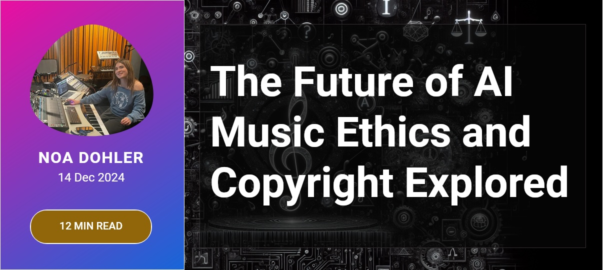Mubert AI transforms music creation, but at what cost?
The rise of AI music creation challenges the very essence of artistic expression. As ethical considerations surrounding AI-generated music intensify, we must confront uncomfortable questions about creativity, authenticity, and the future of human musicianship. Are we ready for this revolution?
Last month, I found myself in a peculiar situation: performing a piano duet with an AI at a tech conference. The audience couldn’t tell which melodies were mine and which were machine-generated. That moment crystallized both the promise and peril of AI music creation.
The Ethical Implications of AI Music Creation
The emergence of mubert ai and similar platforms has sparked intense debate within the music industry. According to OECD research, 78% of music professionals express concerns about AI’s impact on artistic authenticity. These platforms can generate thousands of unique compositions in minutes, raising questions about the value of human creativity.
The technology’s ability to analyze and replicate musical patterns challenges our understanding of originality. Critics argue that AI-generated music risks homogenizing creative expression, potentially diminishing the cultural richness that comes from human experience and emotion. The debate extends beyond aesthetics to the very nature of artistic expression.
Furthermore, the rapid advancement of AI music creation technologies has created a divide between traditionalists and tech enthusiasts. While some embrace the potential for democratizing music creation, others warn about the potential loss of human artistry’s nuanced emotional depth and cultural context.
Copyright Challenges in the AI Music Era
The legal landscape surrounding AI-generated music remains largely uncharted. According to U.S. Copyright Office reports, traditional copyright frameworks struggle to address AI-created works. The fundamental question of authorship becomes increasingly complex when algorithms generate musical compositions.
Current copyright laws were designed with human creativity in mind, making them ill-equipped to handle AI-generated content. The challenge lies in determining ownership rights when multiple parties – developers, users, and the AI itself – contribute to the creative process. This ambiguity has led to numerous legal disputes and calls for regulatory reform.
The situation becomes even more complicated when considering training data. Many AI music generators learn from existing copyrighted works, raising questions about fair use and potential infringement. Industry stakeholders are pushing for clearer guidelines to protect both human artists and AI innovations.
Evolving Business Models in AI Music
The ai music generator revolution is reshaping traditional revenue streams in the music industry. Recent market analyses indicate that AI-generated music platforms are creating new monetization opportunities while disrupting established business models.
Subscription-based services offering unlimited AI-generated music are gaining traction, particularly among content creators and small businesses. These platforms provide cost-effective alternatives to traditional music licensing, with some services reporting user growth rates exceeding 200% annually. The democratization of music creation has opened new markets previously inaccessible to smaller players.
However, this shift raises concerns about fair compensation for human musicians. Industry experts suggest that hybrid models, combining AI efficiency with human creativity, might offer the most sustainable path forward. These models could protect artists’ interests while capitalizing on AI’s capabilities.
Future Integration of AI and Human Musicianship
The path forward lies in thoughtful integration of AI music tools with traditional musicianship. According to Berklee College of Music research, successful AI-human collaboration requires careful consideration of ethical guidelines and artistic integrity.
Educational institutions are beginning to incorporate AI music tools into their curricula, preparing the next generation of musicians for a hybrid creative landscape. This approach acknowledges AI as a powerful tool while emphasizing the irreplaceable value of human creativity and emotional expression.
The future may see AI serving as an enhancement to human creativity rather than a replacement. Musicians are discovering ways to use aimusic generator technology to expand their creative possibilities, creating new genres and pushing the boundaries of traditional music-making.
Innovative Opportunities in AI Music Technology
Start-ups could develop AI-powered music education platforms that adapt to individual learning styles, creating personalized curriculum paths for aspiring musicians. Such systems could analyze practice sessions in real-time, providing instant feedback and tailored exercises worth an estimated $5 billion market by 2025.
Large corporations might invest in developing hybrid performance platforms that seamlessly blend AI-generated accompaniment with live human performers. This technology could revolutionize live entertainment, creating immersive experiences that combine the best of both worlds, potentially generating $3 billion annually.
Another promising avenue lies in AI-driven music therapy applications. Companies could create specialized algorithms that generate therapeutic soundscapes based on real-time biometric data, targeting the growing $2.7 billion music therapy market with personalized healing experiences.
Orchestrating Tomorrow’s Sound
The convergence of AI and music creation presents both challenges and opportunities. As we navigate this evolving landscape, we must ensure that technological advancement enhances rather than diminishes human creativity. What role will you play in shaping the future of music? Share your thoughts on how we can best harmonize artificial and human creativity in the comments below.
Essential FAQ on AI Music Ethics
Q: Can AI-generated music be copyrighted?
A: Yes, but with limitations. Current copyright law generally requires human creativity, making AI-generated music’s copyright status complex and often dependent on the level of human involvement.
Q: How does AI music creation affect professional musicians?
A: AI tools are changing the music industry landscape, offering new opportunities while challenging traditional roles. Studies show 60% of musicians now incorporate AI tools in their creative process.
Q: Is AI-generated music legal to use commercially?
A: Yes, when using properly licensed AI music generators. However, users must verify the specific terms of use and licensing agreements, as regulations vary by platform.
